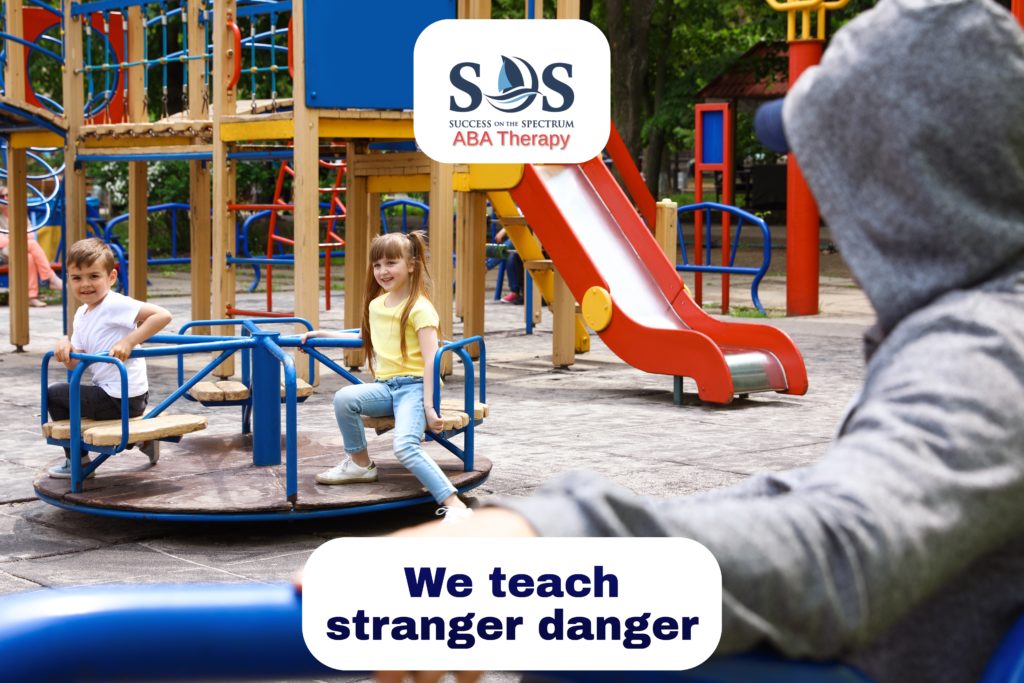Early intervention autism services in Florida provide a critical foundation for helping children with autism reach their full potential. When support begins at a young age, families can access evidence-based therapies that address developmental delays, improve communication, and promote independence. These services are most effective when introduced early, allowing children to build essential skills during a key period of growth.
At Success on the Spectrum (SOS) Fishhawk, our licensed professionals specialize in structured, individualized programs to meet each child’s unique needs. Early intervention fosters short- and long-term success by integrating therapy into daily routines and working closely with families. Florida families benefit from local access to quality care that can make a major difference in a child’s developmental path.
1. Access to the Best ABA Programs for Toddlers in Florida
Early intervention opens the door to the best ABA programs for toddlers in Florida, giving families access to proven methods that support development during a child’s most formative years. These programs focus on building core skills through individualized therapy rooted in Applied Behavior Analysis (ABA).
Individualized Plans Tailored to Early Development
Effective ABA programs for toddlers are built on comprehensive assessments that help define each child’s specific needs and learning style. This approach allows therapists to target behavior, communication, and daily living skills.
- Personalized objectives: Goals are reviewed regularly based on the child’s current abilities.
- Age-appropriate teaching: Therapists use methods suited to a toddler’s developmental stage.
- Consistent progress monitoring: Regular evaluations help track growth and adjust plans as needed.
This level of customization ensures therapy is both focused and adaptable, maximizing developmental outcomes.
Engaging, Play-Based Learning Environment
Toddlers learn best through structured play, and ABA programs in Florida often integrate learning into playful, engaging activities. This makes therapy both effective and enjoyable.
- Natural reinforcement: Positive behaviors are rewarded in meaningful, age-appropriate ways.
- Social interaction through play: Children practice communication and turn-taking in peer-based settings.
- Skill generalization: Lessons are applied in real-life situations to promote independence.
These strategies help toddlers retain and apply skills across different environments and routines.
Family Involvement for Consistent Support
Family engagement is key to ABA therapy, ensuring continuity between sessions and home life. Parents receive guidance to reinforce strategies and better understand their child’s behavior.
- Parent training sessions: Families learn how to implement ABA techniques at home.
- Ongoing communication: Therapists regularly update parents on goals and progress.
- Emotional support: Parents receive resources to manage challenges and celebrate progress.
By actively participating, families contribute to a more consistent and supportive setting for their child’s growth.
2. Responding to Early Signs of Autism with Intervention in Florida
Recognizing the early signs of autism and acting promptly is essential for adequate support. Responding to early signs of autism with intervention in Florida allows families to address developmental concerns before they become more pronounced. Early action can significantly improve communication, behavior, and social outcomes.
Identifying Early Indicators in Toddlers
Early signs of autism sometimes appear as early as 18 months. Florida families are encouraged to observe developmental milestones and consult specialists when concerns arise. Timely evaluations can lead to earlier support.
- Limited eye contact: Difficulty keeping eye contact during interactions.
- Delayed speech: Slower development of language and verbal communication.
- Restricted interests: Repetitive behaviors or intense focus on specific objects.
- Reduced social engagement: Lack of interest in playing with peers or responding to names.
Recognizing these indicators supports early diagnosis and faster access to appropriate care.
The Role of Diagnostic and Therapy Services
Once early signs are noted, families can pursue a formal evaluation and begin evidence-based therapy. Florida offers various diagnostic services and treatment providers focused on early childhood needs.
- Developmental screenings: Pediatricians and specialists conduct age-appropriate assessments.
- Behavioral assessments: Detailed evaluations help determine the level of support required.
- Prompt access to therapy: Early referrals quickly connect families to ABA and related services.
Early intervention ensures children receive targeted support during critical developmental windows, improving the potential for meaningful behavior, communication, and social functioning progress.
3. Connecting Families to Florida Autism Early Support Programs
Connecting families to Florida autism early support programs is crucial in ensuring timely, effective care for children showing signs of developmental delays. These programs offer essential services and resources that help families navigate the diagnostic and therapeutic journey with guidance and structure.
Accessing Local and Statewide Resources
Florida provides various early support programs accessible through healthcare providers, schools, and community agencies. These services are designed to help families obtain the support they need as early as possible.
- Early Steps Program: A state-funded service that supports infants and toddlers with developmental delays.
- Local education agencies: School districts may offer evaluations and therapy options before formal schooling begins.
- Community-based providers: Clinics and centers specialize in ABA therapy and related developmental services.
These resources help ensure families receive support regardless of financial background or geographic location.
Coordinating Services with Professional Guidance
Navigating the early intervention process can be complex. Support programs often include case coordination and professional consultation to streamline access and communication.
- Case managers: Assigned professionals assist families in managing appointments and service plans.
- Therapist collaboration: Providers work together to deliver consistent care across settings.
- Parent education: Training sessions and materials are offered to help families understand the therapy process.
By participating in Florida’s early support programs, families can access a reliable network of care that promotes early progress and long-term development.
4. Enhancing Communication and Social Interaction from a Young Age
Developing strong communication and social skills early in life is essential for long-term success. For children with autism, early intervention plays a vital role in building these foundational abilities. Structured therapy programs are designed to enhance communication and social interaction from a young age, using individualized strategies that match the child’s developmental level.
Building Functional Communication Skills
Effective communication is more than just spoken language—it includes gestures, expressions, and alternative methods tailored to each child’s strengths. Therapy focuses on helping children express needs, make choices, and engage with others meaningfully.
- Speech and language goals: Therapists address verbal and non-verbal communication delays.
- Alternative communication tools: Visual aids or devices support children with limited speech.
- Reinforcement techniques: Positive responses encourage continued communication efforts.
These strategies help children reduce frustration and improve their ability to connect with their environment.
Encouraging Positive Social Behaviors
Children with autism often face challenges in social settings. Early intervention provides opportunities to practice social skills in controlled and supportive environments.
- Peer modeling: Children learn through interaction with therapists and other children.
- Structured play sessions: Sessions teach turn-taking, eye contact, and shared attention.
- Social stories and scripts: Tools that help children understand social situations and expectations.
Introducing social concepts early gives children the confidence and skills to participate in group settings, form relationships, and fully engage in daily activities.
5. Promoting Independence Through Individualized Skill Development
Early intervention programs are designed to equip children with autism with practical, age-appropriate skills that foster greater independence. Promoting independence through individualized skill development allows each child to progress at their own pace while working toward meaningful functional goals. These skills lay the groundwork for increased autonomy in both home and community environments.
Targeting Daily Living and Self-Care Skills
Individualized plans prioritize skills that support a child’s ability to complete everyday tasks. Therapists focus on practical activities that can be applied throughout the child’s routine.
- Toileting and hygiene: Instruction on bathroom use, handwashing, and grooming.
- Feeding and eating habits: Support with utensils, self-feeding, and trying new foods.
- Dressing skills: Teaching how to put on and remove clothing with minimal assistance.
These skills increase the child’s ability to participate in home routines and reduce reliance on caregiver support.
Developing Problem-Solving and Coping Strategies
Children with autism often benefit from structured techniques for managing changes in routine and approaching unfamiliar situations. Therapy includes methods for building flexibility and emotional regulation.
- Visual schedules: Tools to support transitions and understanding of daily expectations.
- Choice-making opportunities: Encouraging children to make decisions throughout the day.
- Calming strategies: Techniques to help children respond to frustration or overstimulation
With focused intervention, children take more initiative and manage their responses more effectively. As these foundational abilities strengthen, so does the child’s capacity for greater independence in everyday life.
6. Reducing Long-Term Educational and Behavioral Challenges
Early intervention is critical in reducing long-term educational and behavioral challenges for children with autism. Children are better prepared for academic settings and social environments by addressing developmental delays and behavioral concerns early. Structured therapy helps build the foundational skills necessary for long-term success.
Preparing for School Readiness
Children who receive early intervention are more likely to enter school with the skills needed to adapt to structured learning environments. These skills improve attention, cooperation, and the ability to follow instructions.
- Classroom routines: Children practice skills such as sitting, listening, and transitioning between tasks
- Following directions: Therapists reinforce one-step and multi-step instructions
- Group participation: Activities simulate classroom settings, promoting engagement with peers
These school-readiness skills support a smoother transition into early education and reduce the need for intensive accommodations.
Addressing Challenging Behaviors Early
If not addressed early, behavioral issues can interfere with learning and daily functioning. Early intervention focuses on understanding the cause of behaviors and teaching appropriate alternatives.
- Behavior assessments: Identify triggers and develop targeted strategies
- Positive reinforcement: Encourages appropriate behaviors and skill acquisition
- Replacement behaviors: Children are taught acceptable alternatives to disruptive actions
By managing behavior early, families and educators can prevent patterns that are harder to change later. With the proper support, children are more likely to succeed academically throughout their educational journey.
Conclusion
Investing in early intervention autism services in Florida is one of the most impactful steps families can take to support their child’s growth and development. From building communication skills to encouraging independence and reducing long-term challenges, early support paves the way for lifelong success. Families can feel confident in the journey ahead with access to expert-led programs, supportive resources, and individualized care. The benefits of starting early are clear—and the sooner intervention begins, the greater the possibilities become for each child’s future.
Take the first step toward meaningful progress. Connect with Success on the Spectrum Fishhawk today at https://childrensacademyfishhawk.com/contact-us/ or call 813-689-6819 to learn more about available services and how to get started.




